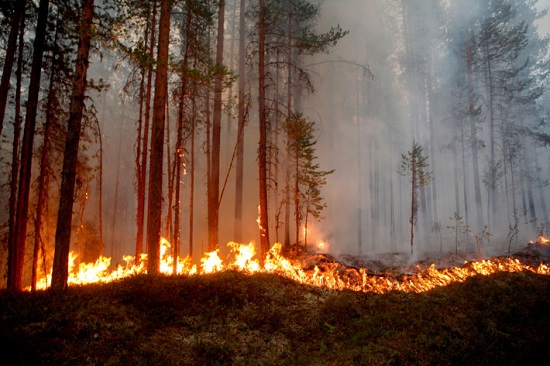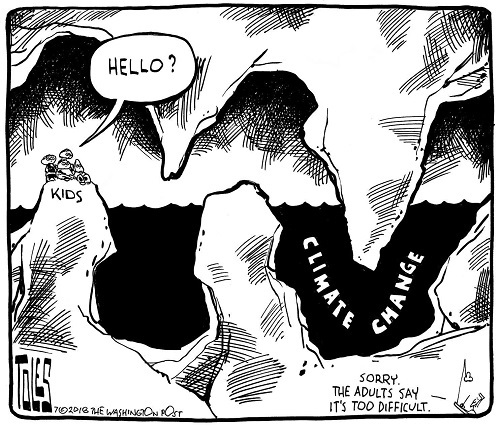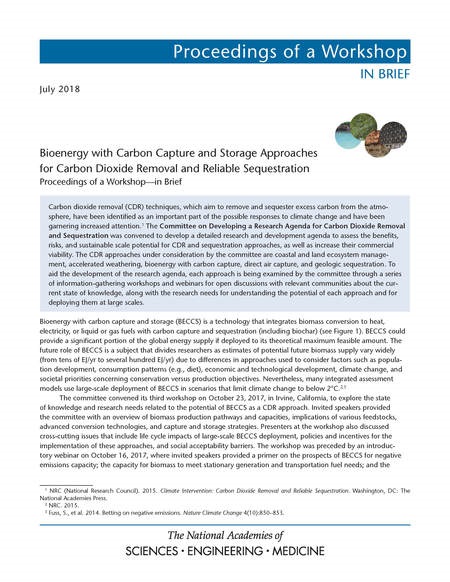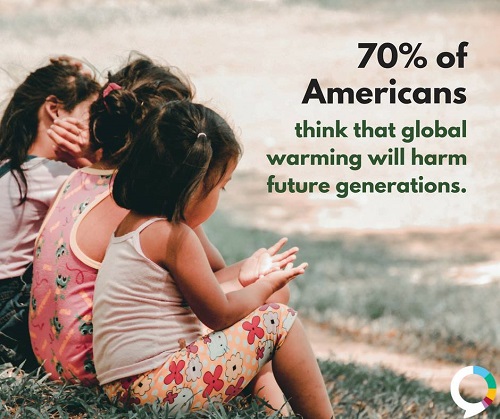2018 SkS Weekly Climate Change & Global Warming Digest #29
Posted on 22 July 2018 by John Hartz
Story of the Week... Analysis of the Week... SkS Highlights... El Niño/La Niña Update... Toon of the Week... Quote of the Week... Graphic of the Week... SkS in the News... Photo of the Week... SkS Spotlights... Video of the Week... Reports of Note... Coming Soon on SkS... Poster of the Week... SkS Week in Review...
Story of the Week...
A Global Heat Wave Has Set the Arctic Circle on Fire

Fire burns in Karbole, Sweden. Photo: Mats Andersson/AFP/Getty Images
From Japan to Sweden, and Oman to Texas, a global heat wave is setting records, igniting wildfires, and killing dozens all across the world this week.
The south-central region is home to the highest temperatures in the U.S. this week, with nearly 35 million people living under excessive heat warnings issued by the National Weather Service. Temperatures are expected to be in the triple digits across Texas this weekend, marking the most severe heat wave in the state since 2011.
The Texas heat has already led to record-breaking days for the Texas power grid twice this week. Things aren’t any better elsewhere in the region, with heat indexes in Oklahoma, Arkansas, and Louisiana reaching up to 110 degrees.
A Global Heat Wave Has Set the Arctic Circle on Fire by Adam K Raymond, Daily Intelligencer, New York Magazine, July 20, 2018
Analysis of the Week...
The 5 most important questions about carbon taxes, answered
Carbon taxes are in the news these days. In recent months, not one but two conservative national carbon tax proposals have emerged, disrupting the usual partisan dynamic on climate policy.
First there was the proposal from the Climate Leadership Council, a group of (mostly older, retired) Republicans and centrists, which was released last year but recently gained the backing of a new big-money conservative PAC. And next week, Rep. Carlos Curbelo (R-FL), co-chair of the House Climate Solutions Caucus, plans to release a carbon-tax proposal of his own.
Neither proposal has a snowflake’s chance in hell of passage any time soon. And on Thursday, the House passed a resolution trying to squash even the possibility of a carbon tax. But the existence of these proposals does indicate a heightened level of awareness of and interest in carbon taxes. So now seems like a good opportunity to review some of the basics.
The 5 most important questions about carbon taxes, answered by David Roberts, Energy & Environment, Vox, July 20, 2018
Toon of the Week...

Quote of the Week...
“The red alert is on,” Laurent Fabius, who was president of the 2015 international climate change negotiations in Paris, told an audience last week at the EuroScience Open Forum, Europe’s largest interdisciplinary science meeting. As of 2015, global temperatures had risen about 1 degree Celsius above pre-industrial levels. “It’s a race against time,” Fabius said, and the political challenge is to avoid acting too late.
What Climate Change Looks Like In 2018 by Christie Aschwanden, Climate, FiveThirtyEight, July 19, 2018
SkS in the News...
Carolyn Kormann interviewed John Cook for her New Yorker magazine article, In Andrew Wheeler, Trump Gets a Cannier E.P.A. Chief. Cook's observations are contained in this paragraph:
Wheeler has long been a climate denialist, fighting any policies that would establish mandatory carbon limits. In 2003, in a long speech on the Senate floor opposing a climate bill put forward by Senators John McCain and Joe Lieberman, Inhofe famously said that “man-made global warming is the greatest hoax ever perpetrated on the American people.” Wheeler defended his boss’s position for years, criticizing the work of the Intergovernmental Panel on Climate Change and casting doubt on the science. (In 2006, he said in an interview with E&E News, “The fact is that the climate changes regularly.”) On Friday, however, in an interview with the Washington Post, Wheeler changed his position—or, at least, chose his words carefully. He said that he believes climate change is real and that “people have an impact on the climate.” (During his Senate confirmation hearings for deputy administrator, last November, he expressed more uncertainty. “I believe man has an impact on the climate,” he said. “But what is not completely understood is what the impact is.”) John Cook, a climate-change communications researcher at George Mason University, categorizes this kind of statement as “doubt-mongering misinformation,” Republicans’ latest argument, he told me, to support climate inaction. (Previously, Wheeler and others used the “explicit misinformation” argument, Cook said. “It seems to be on its way out.”) Wheeler now claims, as he told the Post, that he has “always deferred to career scientists,” and will continue to do so. In his first e-mail to E.P.A. employees as acting administrator, last week, he wrote, “I look forward to working alongside all of you to continue our collective goal of protecting public health and the environment.”
In his New York Times article, He Sues to Discredit Climate Scientists. Now He’s Being Sued by His Allies., John Schwartz wrote:
The efforts by Mr. Schnare and Mr. Horner to obtain climate scientists’ emails followed a trail blazed in 2009 in an episode known as Climategate, when hackers exposed a trove of private messages between scientists. Global warming denialists took the blunt discussions out of context to allege that researchers had tampered with data, but subsequent investigations found no evidence of fraud.
The first link in the above is to the Basic version of the SkS rebuttal article, Clearing up misconceptions regarding 'hide the decline'
Reports of Note...

Coming Soon on SkS...
- Scientists detect a human fingerprint in the warming of the atmosphere (John Abraham)
- Wind Energy: What About Those Subsidies? And, the Key Advantage over Natural Gas (greenman)
- Facebook video spreads climate denial misinformation to 5 million users (Dana)
- CSLDF is fighting attacks on science. Here’s how you can help (Lauren Kurtz)
- Permafrost and wetland emissions could cut 1.5C carbon budget ‘by five years’ (Robert McSweeney)
- 2018 SkS Weekly Climate Change & Global Warming News Roundup #30 (John Hartz)
- 2018 SkS Weekly Climate Change & Global Warming Digest #30 (John Hartz)
Poster of the Week...

SkS Week in Review...
- 2018 SkS Weekly Climate Change & Global Warming News Roundup #29 by John Hartz
- 97% of House Republicans foolishly reject carbon taxes by Dana Nuccitelli (Climate Consensus - the 97%, Environment, Guardian)
- Ocean Temperature - Part 2 by Irek Zawadzki
- How Wind Turbines Bolster Rural America by greenman360 (Climate Denial Crock of the Week with Peter Sinclair)
- SkS Analogy 13 - Water glasses and Greenhouse gases by evan & jg
- Comprehensive study: carbon taxes won't hamper the economy by Dana Nuccitelli (Climate Consensus - the 97%, Environment, Guardian)
- 2018 SkS Weekly Climate Change & Global Warming Digest #28 by John Hartz































 Arguments
Arguments






























The Guardian had an interesting article reviewing peer reviewed research that showed suicide increases when temperatures increase. For a high emission scenario they estimate 9,000-40,000 extra suicides in the USA and Canada alone by the year 2050. That is in addition to the addditional deaths caused by increased violence due to temperature rise.
The article mentioning a "global heat wave" lists places that are all in the northern hemisphere. Is there really a heat wave in the southern hemisphere too, or is this like the mediaeval warm period?
Lachlan @2,
The NH has had some impressive hotspots through July. ClimateReanalyser.org give daily maps of temperature anomalies (but not kept up-to-date. At-time-of-writing they stretch to 5th July) as well as the today's anomaly map. Also there is the 17th July anomaly map cut&pasted here. These graphics also give NH & SH average anomalies so we can see that through July 1st-5th the SH had a cooler anomaly than the NH but as of (the today anomaly map at-time-of-writing) 24th July the NH & SH anomalies were similarly hot (NH +0.5ºC, SH +0.4ºC). We could perhaps speculate with a possible reason for a cooler SH anomaly by suggesting that the latitudes with the hotspots which are boosting that NH anomaly are mainly land but the equivalent latitudes in the SH are mainly ocean.
As for comparing this month's anomalies with the MWP, I don't think such momentary events can be compared with multi-century tempurature averages, even if they were similar in form.
Lachlan,
Nobody notices heat waves in the winter. Since it is currently winter in the southern hemisphere heat is not mentioned.
Can you recall the amazing "Summer in Winter" which destroyed existing heat records across North America? That is because it was a heat wave in winter. In several locations the low temperature at night was higher than the previous highest daily temperature ever recorded for that location. Heat records were shattered but it was not reported that much in the mainstream mnedia.
This article talks about the heat records set during the recent Australia summer.
Lachlan:
Summer in Winter was March, 2012. The current weather forcast (link will only be good today) shows extreme heat across most of Australia for today. It will not make the news because it is hot in winter so no all time heat records will be broken (daily heat records will be broken).
I have three questions and I really hope Dana or some other high profile science bod can answer them.
(1) Why are media outlets in the UK avoiding the use of the term Climate change to explain this heatwave and where climate change is cited doubt is offered by lines such as 'its not just down to climate change'. For example, two Guardian articles in particular took this approach offering the fragmented phase shifting jet stream and a warmer Northern Atlantic as reasons in addition to climate change. However, many other articles have attributed both the changing jet stream and warming oceans to climate change!
(2) During this heatwave and for sometime now I have noted that the hottest part of the day has shifted to early evening time and noted that the heat is not just dissipating at night like it used to. Is this down to increased CO2 levels and perhaps an up tick in methane levels too?
(3) Recently media outlets in the UK have been stating that the Government is planning for emergency food stockpiling and provision in the UK and even the RAF has been asked to plan for food distribution. BREXIT has been cited but I would like to ask for opinions on this; to what extent is this heatwave and the impacts to crop yields a more likely explanation for such emergency planning? Germany too has issued warnings and asked citizens to stockpile food and water and the same is true for a number of other EU countries.
Thanks for reading.
Not a high profile science bod, but I will attempt.
1/ Caution is required. Climate change obviously make heatwaves hotter, but proximal cause of actual heatwave is in the behaviour of jet streams. There is evidence to link climate change to this (see here and here) but it would be a brave person to call this settled science. Trying to explain how the media behaves though it well outside the scope of this site.
2/ Hmm. I dont see any evidence for this. Peak temperature is usually 3pm and a quick perusal of UK weather data doesnt suggest any obvious change in that. Do you have an analysis to back this up?
3/ Seems unlikely to me. The 2016 requests in Germany for stockpiling (not just food and water) were issued by CD during spate of attacks. Guessing reasons for government behaviour can be as difficult as for media. Not an area where any physical science has much to contribute.
Thank you for your response.
(1) Yes, it seems some further articles have come out being more firm in attributing climate change to this northern hemisphere ‘heat wave’ via citation of the jet stream fragmentation (already attributed to climate change via arctic warming) and the warmer north Atlantic (also attributed to climate change). There have also been some articles stating we should perhaps expect summers like this to become the norm.
(2) By way of an easy accessible data point the met office histograms have all had temperatures peaking early evening time for July with variation of peaks between 1700 and 1900 hours. This has met with what many have experienced on the ground in the South of the UK and has been a topic much discussed around the dinner table. Not a scientific analysis but the night temperatures have also been high (accepted) and heat dissipation has not been as intense (by virtue of the accepted hotter nights)
(3) When I read articles about farmers saying their crop yields across not just the UK but Europe and elsewhere too have already been significantly effected and one counts growing weeks until Spring (March), then how can one not consider the stockpiling of food as unrelated to that too?
@ Jim Kirk #8
Re your third point, check out:
The Global Heatwave Is About to Hit Your Wallet by Rachel Morison, Marvin G Perez & Nicholas Larkin, Climate Changed, Bloomberg News, July 25, 2018
JimKirk,
While you and I am concerned about crop failures due to heat waves, I doubt that the British government is. I think they really are concerned that their food distribution system could have severe problems from Brexit, especially a no-deal Brexit. Since no-deal is looking more likely it might be prudent to stash away some food.
Brexit issues would be something that would be ironed out in a few weeks or months. If there are severe crop disruptions they will affect the food supply for longer and in different ways. The poor would suffer the most.
JimKirk,
Apparently I was mistaken about the heat waves and British concern about food. This article in the Guardian discusses both the drought affecting food yields and Brexit affecting food supply.
Other sources say that Russian wheat is suffering. We will have to wait a few weeks to find out how food yields across the world have been affected by the heat waves.